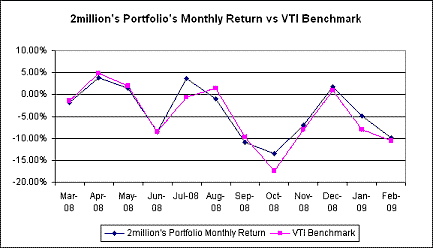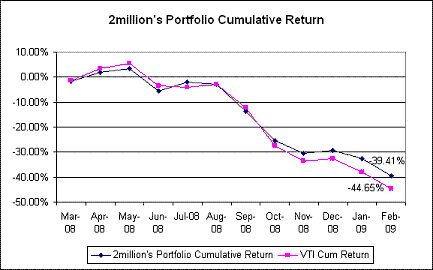A Year of Portfolio Benchmarking
Its been 1 year since I started to track my stock investments on a monthly basis and compare them to a simple benchmark, the Vanguard Total Stock Market Index ETF (VTI). Here a couple charts I put together to see how I have been fairing:


I find the very strong correlation between my portfolio and the VTI benchmark very interesting. My portfolio has beat the benchmark 6 months our of the past 12 months and cumulatively beat the index by about 5%.
I guess that doesn't surprise me - it tells me that at least so far Im doing the right thing by investing my money instead of just dumping it all into VTI. However, I have a feeling my portfolio did not perform as well when the market was gaining - that something to watch as the economy recovers.
Here are my monthly portfolio benchmarking results:
- February 2009 Investment Portfolio
- January 2009 Investment Portfolio
- December 2008 Investment Portfolio
- November 2008 Investment Portfolio
- October 2008 Investment Portfolio
- September 2008 Investment Portfolio
- August 2008 Investment Portfolio
- July 2008 Investment Portfolio
- June 2008 Investment Portfolio
Related in Stocks:
Chairmen Letters to Shareholders (Mar 09, 2014) Its that time of year again --the close of fiscal years means an overload of annual reports including Letters to Shareholders. Two annual letters that I read each year are those from Berkshire Hathaway (Warren Buffet) and Fairfax Financial (Prem...
Investment Performance January 2014 (-2.94%) (Feb 23, 2014) January 2014 Investment Report: January Highlights: January was a bad way to start out the year, but our portfolio performed slightly better thank our benchmark (-2.94% vs -3.17%). We made our regular monthly investments in our Roth IRAs, and some...
Investment Performance December 2013 (+2.20%) (Jan 10, 2014) December 2013 Investment Report: December Highlights: December was another subpar for us as our portfolio performed poorly compared to our benchmark (+2.20% vs +2.58%). We made our regular monthly investments in our Roth IRAs, and some dividends & dividend reinvestments....


Comments (10)
I am a bit puzzled about your strategy, if you are tracking and matching the market index almost completely, why go through the headache of having separate investments. Wouldnt it be easier/simpler to hold a couple of broad funds in your personal accounts and still get the same result?
Posted by waren's bufet | March 13, 2009 12:48 PM
Your absolutely right - if I am matching or not beating the index returns then I should be invested in index funds. I have managed my own investments for several years, but I never really benchmarked them till now. This is giving me my first glimpse at how I compare.
Posted by 2million | March 13, 2009 12:57 PM
2mill:
i would be curious how you fare if you remove your ibm holdings from the mix (goes back to my comment a few weeks back).
- s.b.
Posted by some body | March 13, 2009 3:07 PM
2mill:
also, how exactly do you track vs your benchmark? i mean, how do you replicate your buys (and sells, if any) on your benchmark? and how about dividends (yours as well as the benchmark's)?
- s.b.
Posted by some body | March 13, 2009 3:09 PM
I would say from following your investment postings for some time that over 100% of you overperformance over your benchmark is attributable to your being overweight in IBM which has weathered the downturn better than the overall mkt. This may have served you well in the past, but you continue to ignore the fact that it is very dangerous to be overweight your employer's stock in your portfolio. It is entirely possible that a layoff and a drop in those holdings could hit you at the same time (these being highly correlated events for when do large firms lay off people?) and then you would be in a very tough situation. Your IBM stock option exposure is excessive, but to also have it overweight in your stock portfolio is imprudent at best and dangerous to your family's finances at worst.
You also got very lucky in your small ROH position, which may embolden you into thinking that you are a good investment manager. Bill Miller at Legg Mason was also regarded as such until the wheels fell off his wagon.
Your propensity to gamble with your portfolio in risk (merger) arb, which you do not understand at all, health care, energy and financial stocks, etc, give me the inclination to conclude that you would be best served in a passive investment strategy.
Posted by ETFnerd | March 13, 2009 4:40 PM
Love your site, especially your honesty. As much as you pay attention to your finances, you should check out the guy the writes on urbansurvival.com. I think you will find his market analysis fascinating. I've been following him since last year and he has been spot on every prediction so far. I think you will find it helpful.
Posted by hill country hero | March 13, 2009 6:11 PM
Are you including reinvested dividends into the returns you show for VTI? I have noticed that returns pulled from some Web sources do not account for this. I belive your portfolio returns do include reinvested dividends, which could explain some of the performance difference. If you have factored the dividends into VTI and made a true apples to apples comparison, then Congrats!
Posted by Golfer65 | March 13, 2009 6:35 PM
sb - See my monthly portfolio posts - the charts above are based on that data.
ETFnerd- Appreciate your comment - I am surprised didn't give any favorable feedback on my obvious moves over the past 12 months to increase my portfolio in index investments (12 mos again I have nearly nothing in this portfolio that was in index investments).
Posted by 2million | March 13, 2009 6:56 PM
It is fair to say that you have had a cautious drift to a passive tilt. Sending a mixed message may have watered down the points that I wanted to make, but I guess I grew up in a household where achievement was taken for granted and failure to achieve expectations were not.
Maybe this is not the best way to communicate, but I don't believe you to be an ordinary individual.
Posted by ETFnerd | March 14, 2009 5:08 PM
Congrats on beating the index, but how do you measure whether your excess return was accomplished without simply taking more risk than the benchmark takes?
Also, there's no way to know if you have simply been lucky, and therefore whether you will continue to beat the returns of the index. That's why I prefer passive, indexed investments in low fee funds to active stockpicking.
I also agree with ETFnerd that it's very dangerous to invest in your employer's stock. I hope you're being careful.
All that said, I think it's ok to gamble and speculate with a small portion of your portfolio if it distracts you from making foolish decisions with your passive investments. I like the set it and forget it, automated dollar cost averaging approach for 80%+ of investing, and gamble with the rest :-)
Great blog, please continue!
Posted by Thisson | March 17, 2009 11:39 AM